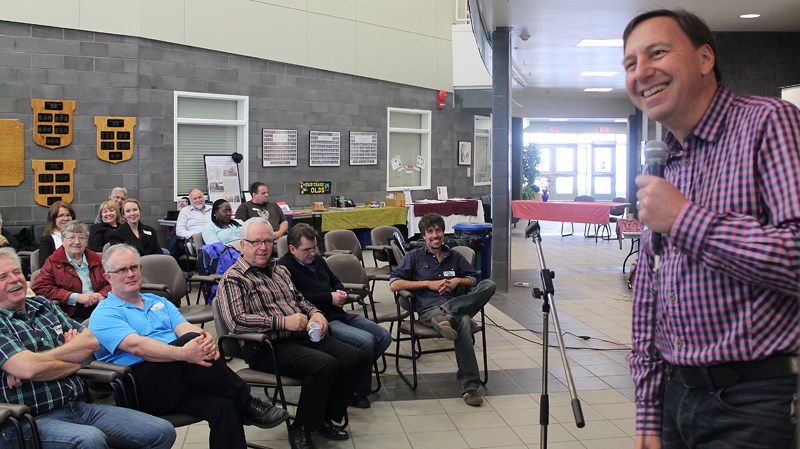Roughly 85 per cent of residents in Olds are happy, but more than half of us are experiencing too much stress in our lives.
These were some of the findings presented to roughly 50 people who came out to the Measuring What Matters: What is Genuine Wealth? event held at Olds High School on April 13.
The gathering, which was hosted by the Olds Sustainability Committee, focused on the results so far from a survey underway in the community on well-being and happiness.
Mark Anielski, a partner and co-founder of Genuine Wealth Inc., is conducting the survey.
According to its website, Genuine Wealth Inc. “is a team of strategists and experts” who “help individuals, enterprises, communities and nations strategize and implement practical solutions for achieving flourishing well-being.”
To do this, the website states, the organization uses the “Genuine Wealth Model,” a “practical model that combines the strengths of economic analysis, conventional financial accounting, and intuitive analytics, that is built on the solid foundation of the science of well-being and happiness.”
Anielski said the survey period began 10 days before the April 13 gathering and is expected to wrap up during the middle of this week.
The results he presented to the gathering came from 162 surveys completed in the community so far and Anielski expects roughly 200 finished surveys to come in before the project ends.
From those 162 surveys, 85 per cent of respondents answered the question “How happy would you say you are?” by saying they are happy or very happy, while five per cent, or eight people, said they were unhappy or very unhappy.
More than three-quarters of Olds residents are satisfied with their lives and their state of well-being on a spiritual, mental and physical level and 83 per cent of respondents feel positive about themselves.
While Anielski said such numbers are a good sign for the community, he told the gathering he was concerned with results in the areas of stress, health, income and inclusion.
When asked if they experience high levels of stress in their lives, 51 per cent of respondents said they agreed and only 29 per cent indicated they disagreed.
While 45 per cent of respondents indicated low levels of stress about finances, 20 per cent indicated high levels of stress in this category.
“That's kind of high too,” Anielski said.
Responses to questions about a person's overall state of health were also troubling, he said.
“With only 57 per cent of you saying excellent or very good, that's too low. I would argue that ‘Very Good' should be the threshold. That's what you should be aiming for.”
He added diet and eating habits responses on the survey were also “not good enough” since only 46 per cent of respondents indicated they felt their habits were very good or excellent.
On a question in the survey about exclusion, 12 per cent of respondents indicated they felt excluded because of race, colour, accent, language, gender, sexual orientation or religion some of the time and two per cent felt such exclusion most of the time.
“I found this a bit problematic,” Anielski said, adding that in the survey's section on sense of belonging, which he identified as a top quality of life issue for all other communities across Canada, 62 per cent of respondents said they have a strong sense, while 13.8 per cent indicated a weak sense.
He said these numbers were lower than what he expected from a community such as Olds.
Nearly 60 per cent of respondents also indicated they are satisfied with cultural activities in the community, while 12 per cent were unsatisfied.
“So again, you might want to say, how do we improve our cultural offerings?” Anielski said.
As for environmental quality, he said the survey indicated “People don't feel satisfied that enough is being done to preserve the natural environment in the community of Olds.”
Overall, Olds scored a 4.11 out of five on a well-being scale, based on survey results so far.
By comparison, Toronto, the unhappiest community in the country according to Genuine Wealth Inc.'s methodology, scored 4.15.
Sherbrooke, Que., and Brantford, Ont., were the happiest communities in Canada, he said.
Once all the surveys are completed, Anielski will present a final report on the results to the Olds Institute for Community and Regional Development.
He told the Olds Albertan he hopes Olds will look at the report “through the lens of their sustainability plan” and use the results as a “baseline” to measure the well-being of the community.
The goal of this project, he said, is for the town to incorporate the concepts of well-being and happiness into its decision-making processes while considering results from the surveys when preparing budgets or planning policies.
Stressors and risks found in the results, Anielski added, could become “action items” the town could target with “resources and investments” in planning policies in the future.



